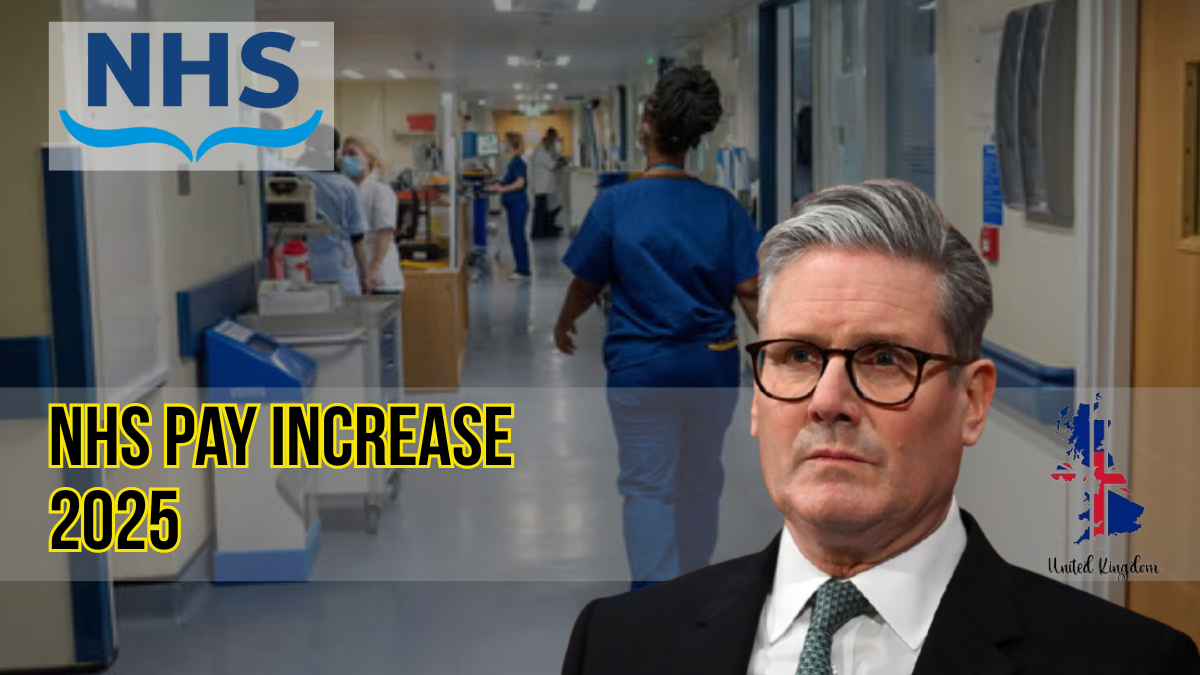The NHS Pay Rise for 2025 marks a critical moment for healthcare professionals across England. After months of negotiations between trade unions and the UK government, a new pay deal has been officially confirmed, set to take effect from July 2025. This agreement comes amid growing concerns over staff retention, rising inflation, and the mounting pressures facing the NHS workforce.

The new salary structure brings long-awaited financial clarity for thousands of NHS employees—from healthcare assistants to senior clinical leaders. Not only does it reflect an average pay rise of approximately 5%, but it also acknowledges the vital role these professionals play in sustaining the country’s healthcare system.
In this article, we provide a full breakdown of the updated NHS salary bands for 2025, highlight who benefits the most, and explore how this pay rise fits into the broader NHS workforce strategy. Whether you’re an NHS employee, policymaker, or simply interested in public sector pay reform, this guide offers everything you need to know about the 2025 NHS pay update.
Summary Table: NHS Pay Rise 2025 UK
| Detail | Information |
|---|---|
| Announcement Date | June 2025 |
| Effective Date | July 2025 |
| Average Pay Rise | ~5% (varies by band) |
| Applies To | Permanent NHS staff on Agenda for Change contracts |
| Affected Elements | Basic salary, overtime rates, unsocial hours pay, regional weighting |
| Official Source | NHS Employers |
Overview: NHS Pay Rise Confirmed for July 2025
As of June 2025, the UK government has officially confirmed the NHS pay rise for 2025. This long-awaited update will come into effect from July 2025 and affects thousands of NHS staff across England.
The decision follows intense negotiations between trade unions and government representatives. The primary goals of this pay rise are to address recruitment and retention issues, acknowledge the hard work of NHS staff, and ease the financial pressures caused by inflation and the rising cost of living.
Objectives Behind the 2025 Pay Rise
The new pay deal is part of the broader NHS Workforce Plan and was designed to:
- Provide fair compensation to NHS staff.
- Support workforce retention amid critical shortages.
- Address inflation-driven cost pressures.
- Improve job satisfaction and morale across all levels of the NHS workforce.
Detailed Breakdown: NHS Salary Bands for 2025
The NHS operates on a structured pay system called the “Agenda for Change,” which categorizes jobs into pay bands. Here’s how the updated salary bands look for the fiscal year starting July 2025:
| NHS Band | Previous Annual Salary (2024-25) | New Annual Salary (July 2025) |
| Band 2 | £22,383 | £23,500 |
| Band 3 | £23,159 | £24,320 |
| Band 4 | £25,147 | £26,380 |
| Band 5 | £28,407 | £29,890 |
| Band 6 | £35,392 | £37,100 |
| Band 7 | £43,742 | £45,580 |
| Band 8a | £50,952 | £52,800 |
| Band 8b | £58,972 | £61,000 |
| Band 8c | £71,473 | £74,000 |
| Band 8d | £88,884 | £92,000 |
| Band 9 | £105,254 | £109,500 |
These changes represent a consistent effort to keep NHS wages in line with economic realities and staff expectations.
Who Gains the Most from the July 2025 Pay Increase?
Although the pay rise applies to all NHS staff on Agenda for Change contracts, certain groups benefit more than others:
Band 2 and Band 5 Staff
- These bands include healthcare assistants and registered nurses.
- Both roles have faced severe staffing shortages and high turnover rates.
- The updated salaries aim to boost recruitment and retention in these critical areas.
Senior Management and Specialist Roles
- Higher bands (8a and above) have seen moderate increases.
- These changes help maintain competitiveness with leadership roles in other sectors of public service.
Beyond Basic Salary: Additional Financial Benefits
The pay increase impacts more than just base salaries. Here are other components influenced by the 2025 NHS pay rise:
Overtime and Unsocial Hours Pay
- With higher base salaries, the rates for overtime and unsocial hours (e.g., night shifts, weekends) also rise accordingly.
Regional Weighting
- NHS staff in high-cost living areas like London will see increases in regional pay supplements.
Pension Contributions and Progression
- Pension contribution rates remain unchanged.
- Incremental pay progression within each band continues as normal, allowing staff to earn more annually with experience.
Context: NHS Workforce Strategy and Pay Reform
This 2025 pay adjustment is part of a longer-term strategy to stabilize the NHS workforce. The NHS Workforce Plan outlines multiple initiatives including:
- Improved working conditions.
- Expanded recruitment campaigns.
- Investments in staff training and development.
These complementary efforts, alongside financial incentives, aim to strengthen healthcare delivery across the UK.
Frequently Asked Questions (FAQs)
Q. How much is the NHS pay rise in 2025?
A. The average pay rise is approximately 5%, though exact figures vary depending on the band.
Q. When will the new NHS pay be implemented?
A. The revised salaries take effect in July 2025, with backdated payments available for those employed since April 2025.
Q. Does this affect agency or temporary staff?
A. No. The pay increase applies solely to permanent NHS employees under Agenda for Change contracts.
Q. Will there be more pay rises in 2025?
A. Future increases depend on economic conditions and ongoing negotiations between the government and trade unions.
Q. How does this compare to previous NHS pay rises?
A. The 2025 increase is one of the largest in recent years, reflecting the need to address inflation and recruitment difficulties.
Conclusion: Recognition for Vital NHS Work
The NHS pay rise effective from July 2025 is more than a financial uplift. It is a formal recognition of the dedication, resilience, and contribution of NHS staff at every level.
As NHS workers continue to provide essential services in increasingly demanding conditions, this pay rise serves as a much-needed show of support from both the government and the public.
For the latest and official information, please refer to the NHS Employers website.
Click here to know more



